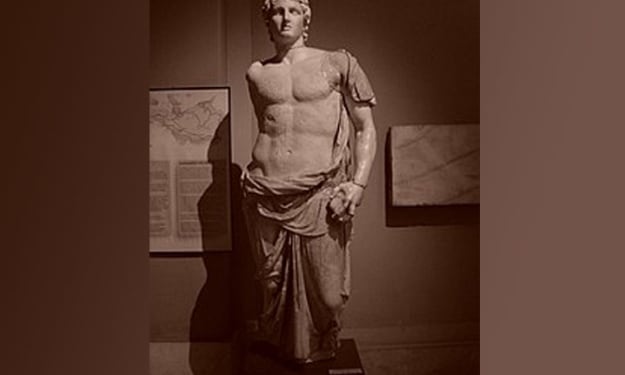
History (derived from Ancient Greek ἱστορία (historía) 'inquiry; knowledge acquired by investigation')[1] is the systematic study and documentation of the human past.
The period of events before the invention of writing systems is considered prehistory. "History" is an umbrella term comprising past events as well as the memory, discovery, collection, organization, presentation, and interpretation of these events. Historians seek knowledge of the past using historical sources such as written documents, oral accounts, art and material artifacts, and ecological markers. History is incomplete and still has debatable mysteries.
History is an academic discipline which uses a narrative to describe, examine, question, and analyze past events, and investigate their patterns of cause and effect. Historians debate which narrative best explains an event, as well as the significance of different causes and effects. Historians debate the nature of history as an end in itself, and its usefulness in giving perspective on the problems of the present.
Stories common to a particular culture, but not supported by external sources (such as the tales surrounding King Arthur), are usually classified as cultural heritage or legends. History differs from myth in that it is supported by verifiable evidence. However, ancient cultural influences have helped create variant interpretations of the nature of history, which have evolved over the centuries and continue to change today. The modern study of history is wide-ranging, and includes the study of specific regions and certain topical or thematic elements of historical investigation. History is taught as a part of primary and secondary education, and the academic study of history is a major discipline in universities.
Herodotus, a 5th-century BC Greek historian, is often considered the "father of history", as one of the first historians in the Western tradition,[13] though he has been criticized as the "father of lies".[14][15] Along with his contemporary Thucydides, he helped form the foundations for the modern study of past events and societies.[16] Their works continue to be read today, and the gap between the culture-focused Herodotus and the military-focused Thucydides remains a point of contention or approach in modern historical writing. In East Asia, a state chronicle, the Spring and Autumn Annals, was reputed to date from as early as 722 BC, though only 2nd-century BC texts have survived.
Ancient Greek
Ancient Greek includes the forms of the Greek language used in ancient Greece and the ancient world from around 1500 BC to 300 BC. It is often roughly divided into the following periods: Mycenaean Greek (c. 1400–1200 BC), Dark Ages (c. 1200–800 BC), the Archaic or Epic period (c. 800–500 BC), and the Classical period (c. 500–300 BC).[1]
Ancient Greek was the language of Homer and of fifth-century Athenian historians, playwrights, and philosophers. It has contributed many words to English vocabulary and has been a standard subject of study in educational institutions of the Western world since the Renaissance. This article primarily contains information about the Epic and Classical periods of the language, which are the best-attested periods and considered most typical of Ancient Greek.
From the Hellenistic period (c. 300 BC), Ancient Greek was followed by Koine Greek, which is regarded as a separate historical stage, though its earliest form closely resembles Attic Greek, and its latest form approaches Medieval Greek. There were several regional dialects of Ancient Greek; Attic Greek developed into Koine.
Dialects
Main article: Ancient Greek dialects
Ancient Greek was a pluricentric language, divided into many dialects. The main dialect groups are Attic and Ionic, Aeolic, Arcadocypriot, and Doric, many of them with several subdivisions. Some dialects are found in standardized literary forms in literature, while others are attested only in inscriptions.
There are also several historical forms. Homeric Greek is a literary form of Archaic Greek (derived primarily from Ionic and Aeolic) used in the epic poems, the Iliad and the Odyssey, and in later poems by other authors.[2] Homeric Greek had significant differences in grammar and pronunciation from Classical Attic and other Classical-era dialects.
History
The origins, early form and development of the Hellenic language family are not well understood because of a lack of contemporaneous evidence. Several theories exist about what Hellenic dialect groups may have existed between the divergence of early Greek-like speech from the common Proto-Indo-European language and the Classical period. They have the same general outline but differ in some of the detail. The only attested dialect from this period[a] is Mycenaean Greek, but its relationship to the historical dialects and the historical circumstances of the times imply that the overall groups already existed in some form.
Scholars assume that major ancient Greek period dialect groups developed not later than 1120 BC, at the time of the Dorian invasions—and that their first appearances as precise alphabetic writing began in the 8th century BC. The invasion would not be "Dorian" unless the invaders had some cultural relationship to the historical Dorians. The invasion is known to have displaced population to the later Attic-Ionic regions, who regarded themselves as descendants of the population displaced by or contending with the Dorians.
The Greeks of this period believed there were three major divisions of all Greek people – Dorians, Aeolians, and Ionians (including Athenians), each with their own defining and distinctive dialects. Allowing for their oversight of Arcadian, an obscure mountain dialect, and Cypriot, far from the center of Greek scholarship, this division of people and language is quite similar to the results of modern archaeological-linguistic investigation.
About the Creator
Nithukanth
Lifestyle refers to the way an individual or family lives, including their daily routines, habits, and overall lifestyle.
Enjoyed the story? Support the Creator.
Subscribe for free to receive all their stories in your feed.






Comments
There are no comments for this story
Be the first to respond and start the conversation.